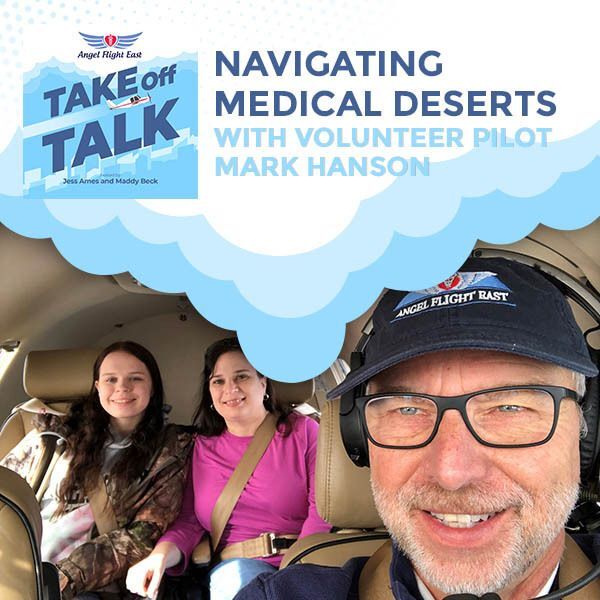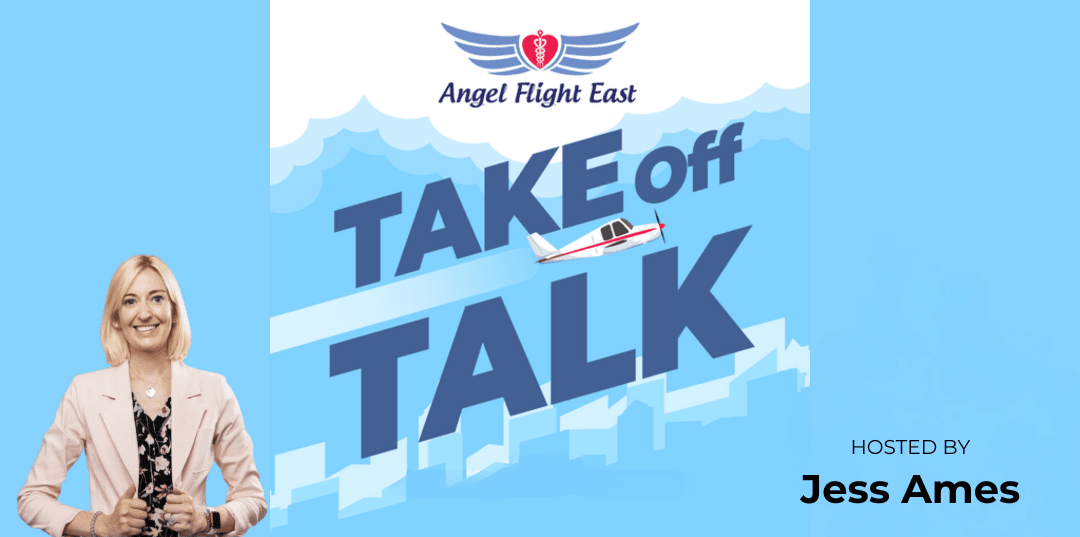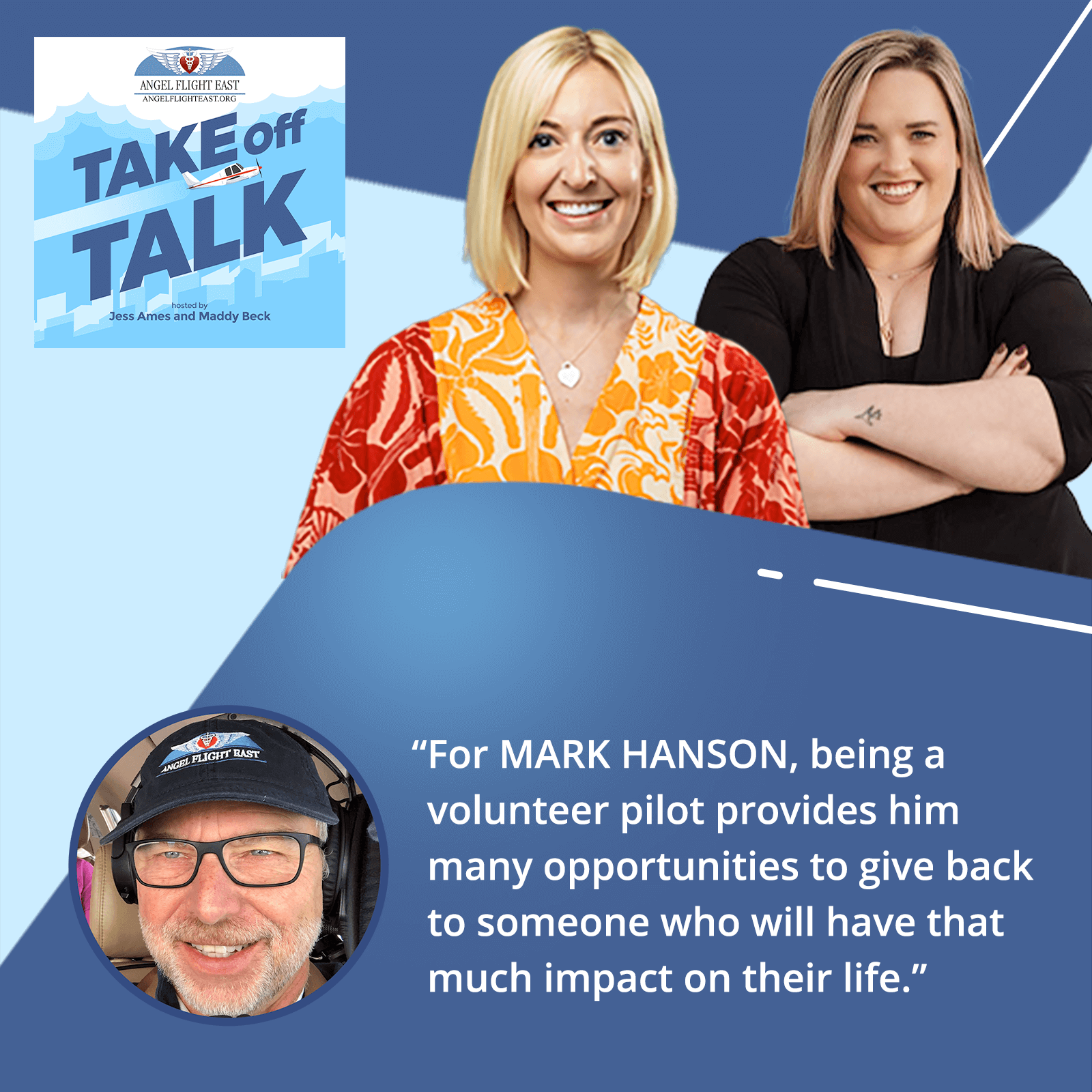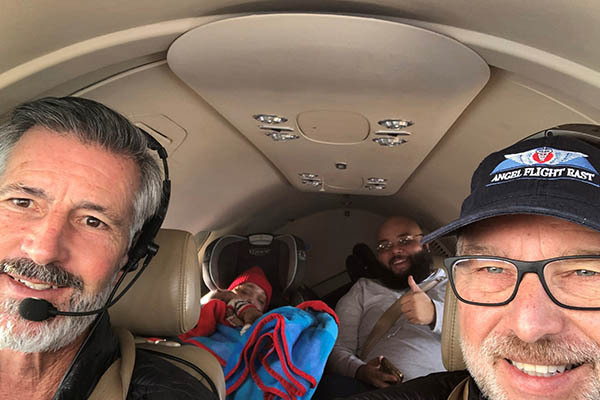
Volunteer flying: where every mile we fly becomes a bridge of hope for those in need, reminding us that the skies hold the power to change lives and heal hearts. Join us as we soar through the skies of compassion, dedication, and collaboration with a remarkable guest, Mark Hanson, a volunteer pilot for Angel Flight East. He shares his 'why' in providing essential flights for those who are in medical deserts. With over 400 volunteer flights under his belt, Mark shares memorable moments and the incredible impact of his missions, including a touching story about a young girl named Katie who embodies resilience and courage. Buckle up and get ready to embark on an uplifting journey of giving back.
---
Watch the episode here
Listen to the podcast here
We have an interview with another pilot. You're here with Maddy, Jess, and volunteer pilot, Mark. Hi, Mark.
How are you?
Good. Thanks for joining us.
Thank you.
Can you tell our audience about how long you've been flying with Angel Flight East?
It's a little over three years now. It's been a lot of fun.
How did you hear about us?
I was flying to Maine. I saw a brochure. It was very nice to see that this service was being offered to those in Maine who need it.
What is your why? What made you get involved with public benefit flying as a whole? I know that you're a little bit more involved in the public benefit flying side than some of our other interviews, so if you want to talk about that as well, go right ahead.
I got my license in 2009. In early 2010, a local airport where I was flying out of, suggested that I look at volunteer flying which was something I hadn't even considered, I didn't even know existed. I rapidly got hooked as a reason to fly. You meet some phenomenal people who are extremely deserving and super appreciative. You don't get many opportunities to give back to someone who will have that much impact on their lives as you’re doing this. That's my why. You get more than you give.
Is there a passenger that has had a big impact on your life or one that's super memorable?
There are many.
It's hard to choose?
It is hard to choose. I think you already know this number, but across people, animals, and conservation, I've done more than 400 volunteer flights now. There was a little girl, Katie, who commutes a very long distance. Usually, I do half of her flight schedule. You would not know that she or her family are enduring a long journey to get unique heart care here in Boston. When you see especially young children going through that who are very mature about it, not complaining, positive, and polite, you can never complain about anything again in your life. It's amazing to see these children and their parents muscle through. Katie's one very good example.
She is so cute. I know Katie is a passenger of LifeLine. We've been working with her flights since I was the flight coordinator. It's been at least like five years. We're so happy to still see her and have an opportunity to help her in her journey and her family.
That's a great example that I'm glad you mentioned, LifeLine. There are so many different organizations across the US and it's important to see collaboration so we can solve a problem that's not within a particular territory, but something that's going halfway across the country. It's great to see this. It makes volunteering that much easier because we're seeing like-minded pilots from all over the country.
That being said, can you talk a little bit about the Air Care Alliance and your work with them as well?
Air Care Alliance is like a trade association for all of the volunteer pilot organizations. I'm on their Board of Directors and a VP. I'm focusing on building awareness across the country in both regional and national organizations. For example, we're going around to all the rotary clubs in the US and presenting the concept of public benefit flying.
Angel Flight East gets mentioned in all the ones I do on the East Coast. Probably, I've done presentations to well over 300 people at this point and maybe 20 clubs. We only started doing this in 2023. I probably have only had one case where they already were aware of public benefit flying and the availability of these flights for medical care. It highlights the need to get the word out that these types of services are available.
Back to something Jesse mentioned before in one of our conversations is, people don't believe you. They say, “You're going to do what? The pilot's going to give all of their time and all the cost of flying their plane to get me from Ohio to New York?” Once they see that we're sincere, it makes their life so much easier. It's good. The Rotarians who are mostly non-pilots are all responding very favorably. We're hoping to result in missions coming in. There are 450,000 Rotarians in the US. Even if we get through to a small number of those, those should help Angel Flight East and others see many more missions.
What are the other organizations you fly for? I'm pretty sure you fly for all of them.
There are probably 80 to 100 organizations in the US, and there are 60 that belong to the Air Care Alliance Membership Organization. I fly for 8 or 9. Turtles fly too is always a good example of one, which people like to discuss. Every year in the fall, some turtles forget to swim from Boston back to Florida. They wash up on a beach and people pick them up, warm them up, and we throw them in private airplanes and fly them South.
I always wondered exactly what they did.
Sometimes I forget to go South too. You can take me too.
It's a lot of fun. In the plane behind you, we take all the seats out and we use banana boxes from the grocery store and we have 1 or 2 turtles per banana box. We can fit about 35 banana boxes in the airplane, we go down, and the rescue organizations pick up the boxes. Luckily, we've managed not to lose any turtles in flight.
That's so funny. I never thought of the banana box as a use for that.
It's fun. There are animals that need rescuing. During particular natural disasters like hurricanes, there are a lot of animals that need to get to new homes. There are a lot of organizations. The largest in the country is Pilots N Paws which transports these animals. If you look at the numbers, in 2022, there were about 35,000 volunteer flights across the country. What's disproportionate is that 16,000 of those were for animals. We need to do a much better job relaying the message that these missions are available for people, get out there, and do more.
It also shows you that there's no shortage of pilots. We all want more pilots, but if we demonstrate the need because missions are available to fly, we'll get more pilots. Our numbers say we have a little over 12,000 registered volunteer pilots. In any given season, probably less than a third of those fly. There’s a lot of opportunity all over. We just need to do a good job like you guys are doing here, spreading the word. Thank you. We'll get there. The medical desert thing, have you guys discussed that yet?
In rural communities?
It's not rural. The medical deserts are specialty deserts. If you have child cancer, those cancers are not always treated in any one area in the US. You may be going from New York to Baltimore because that's where your specialists are, Boston to Ohio. It's not just rural. It's around the type of care that you need. Especially now when physicians are not readily available, generally.
Getting to the specialists that you may need for yourself, your child, or a relative isn't going to be easy. Medical desert is a nice broad term. If you read the numbers, it says it's 30 million people in the US. Even if that's half wrong, it's 15 million. If you look at how many flights we did in 2022, it's under 40,000 at 35,000 number, there's a huge gap. The opportunity is quite large.
I feel like we always say, unfortunately, we don't know how many people may be foregoing their medical care because they think they don't have a way to get there, which is why awareness for public benefit flying is such a huge piece of the puzzle.
We're beginning to get some attention as I mentioned for Boeing's division called ForeFlight, which is the largest provider of map services to pilots in the US. Recently did an interview for that one purpose to try to help us on our journey to build awareness. They put out an email and a video to 100,000 people and put the interview on their YouTube channel. EAA, which not all people know about, which runs the largest air show in the world every year and becomes the busiest airport in the world for one week, is in Wisconsin. They gave us a whole day in 2023 to promote public benefit flying. We're building momentum. We have a long way to go. Thanks for doing this informational video. We'll get there. We just keep at it.
It's all about doing it together. As you said, flying for all these organizations and as you go Rotary Club to Rotary Club making these presentations and mentioning all of us, it's not just about where you live or what that case is or about one organization promoting itself. We all are promoting each other. That's my favorite part. Speaking of working together, working with 8 or 9 plus different flying organizations, what's your favorite place to fly to?
That's always a fun one. There's a couple. We all go to Maine a lot. That's because it's a good example of a rural area. Upstate Maine in the winter is a lot of fun. You get used to breaking out of the clouds and seeing an all-white runway. It's a very unique experience. It's a lot of fun. The people from that area, because they're so remote, are so appreciative. It makes it easy to want hours or more, sometimes two and a half. Even the plane behind you in my image, it's over an hour. People trying to drive are driving eight hours each way. It's easy to see why they're so appreciative.
We went to Maine some time ago and we're the type of people where we got out of the car and people are like, “You don't belong here. You're from a big city.”
I grew up in Maine. I grew up in the second town going into Maine, which had 5,000 people. We were considered a big town. Everything is relative.
Being born and raised in the Philadelphia area, I would not know what to do with myself.
You get a distorted view of things. It doesn't matter. The distortion is relative. If you grow up in a suburb, you're different than a person who grows up in a downtown city environment. Maine's another one of those. It's probably no different than growing up in rural Idaho or rural Illinois. It gets rural quickly in a lot of the states.
"You get a distorted view of things. It doesn't matter. The distortion is relative."
It’s like going from my house to Jess's house.
I live in the cornfields.
The middle of Pennsylvania is pretty interesting. I went to grad school in Pittsburgh, so I got to drive across the state all the time on the way, coming back to Boston.
What made you want to become a pilot?
I grew up in York, Maine. York, Maine was beside Pease Air Force Base, so we constantly saw planes. It was one of those aspirational things for me when I was young. I didn't have great eyesight, so I didn't do it early. Eventually, the rules evolved where it was easy to get around having the eyesight requirement. When the recession hit in 2009 and I was bored, I started flying.
Not everybody's recession hobby, but we'll take it.
It was a tough recession, but at least I had something to do.
What's your real job then, when you're not flying?
Right now, my real job is promoting this.
What a great job. Welcome to our world.
I previously helped very large companies improve their repair services and their supply chains around repair services. My clients were Best Buy, Geek Squad, Cisco Systems, Hewlett-Packard, and things like that. It kept me very busy. I accumulated almost 7 million miles on American Airlines and almost 2 million on Delta. I would be gone 130 days a year somewhere. A lot of travel. Luckily, stayed married through that. It was a very fun niche and interesting evolution of the tech industry as they figured out how to repair the things that they were selling. It was fun. I was paid well.
What's one final thought that you want to leave our audience with?
You don't have to fly and you don't have to be a ground angel and drive. You can just help out by being aware of what your friends may be going through for medical care and asking. If you hear someone that's being treated for an illness, ask how they're getting there. If it turns out that they're driving more than 100 miles, refer them to Angel Flight East and we're extremely happy to take them for a ride. As a pilot, we love any excuse to fly. It may come across as weird that we're gushing that we had an excuse to fly instead of focusing on the fact that we flew someone. Having an excuse to fly and having the benefit of getting someone to care or home from care is doubly good. Just raise awareness and that will help us all.
You're officially hired.
That's good.
Thank you for all you do for both us and everybody else as a part of the ACA or public benefit flying as a whole.
Thank you. Let me know anytime any of your audience has any requests, I'm happy to answer them. If there are any pilots who want to talk, I'm happy to talk to them.
You are on our speed dial.
You're on David's speed dial because he has a flight he needs your help with.
I'm going to try to do it. He's already called me.
Thank you so much for all you do and for sharing your story.
Take care.
---
My favorite memory of Mark is when he took us in his minivan to dinner while we were in Maryland.
I feel like he probably regrets that. He did offer though. I feel like he's the face of public benefit flying.
I feel like I've tried to put so much emphasis and work behind these rotary clubs and all these other social clubs to meet with and connect with, and then he has all these like statistics and you know how I feel about statistics. All of a sudden, I'm like, “I know nothing. I did no work.”
He's amazing and he's always willing to take a flight too.
Always, no matter what. He's been flying for forever.
He said he was going to sign up with the Angel Flight West so he could do a flight on the West Coast.
That's casual. Me too.
Maybe he will take us.
I don't even know what the most Eastern-West state is, but whatever it is, I want to go.
He can leave us there.
Another place. We should make a list of places for people to leave us because, with our luck, we're going to tell somebody they can leave us somewhere. We'll go with them. We're going to get left in like North Dakota.
I'm sure we would still make it fun. I want to go to Idaho and eat a real potato.
Some of the things you say, I don't know how to respond to.
Isn't Idaho known for potatoes?
I think so, but that's the same as saying, “We have to go to Wisconsin for cheese curds.”
They're probably better than Philly cheese curds or Philly potatoes.
I know that when you go to Nifty Fifty’s, which if you're tuning in to this from somewhere that's not the Greater Philadelphia area, it's like a top-ranking junkie fast food place that's the best-known milkshakes in the area. That's probably the only thing I would recommend you get. Maybe they're loaded fries if you're like not feeling yourself that day. There's a sign above their counter that tells you where their potatoes are from that day, like what state.
Where are they usually from?
Idaho. That's the only reason why I know that Idaho has potatoes.
Do they taste differently from a potato from Giant?
I don't know. Where does Giant get their potatoes?
Idaho. Maybe I have had a real potato.
I feel like we have to google this.
I'm going to have to go to Idaho and taste test.
I have a great idea. We can get poutine in all of the states because that's cheese and it's potato.
Some of the gravy tastes weird. They need to rethink their gravy selection.
That’s true. That's fair.
We do love poutine.
That being said, if you're still tuning in at this point, please let us know your favorite spot to get poutine. Whether it is Pennsylvania, Wisconsin for their cheese, Idaho for their potato, or somewhere that has a good gravy. That's not a weird one.
If anybody is tuning in from Idaho, please mail us potatoes straight to the Angel Flight Office.
I'll take a potato. Does a potato need to be packaged? Can you wrap it and put a mailing label on it?
I feel like I would want it in a box.
No. I feel like I'd want to see a wrapped potato show up at my door.
People are going to tune in to this and officially think we lost it. We have, but I still want a potato.
Sugar plum berries.
We hope you tune in next time. I'll let you know about our potato taste testing.
I thought we were going to make it to Idaho by the time you tune in to this, but we will still taste-test the potatoes from here. Stay tuned.
Important Links







